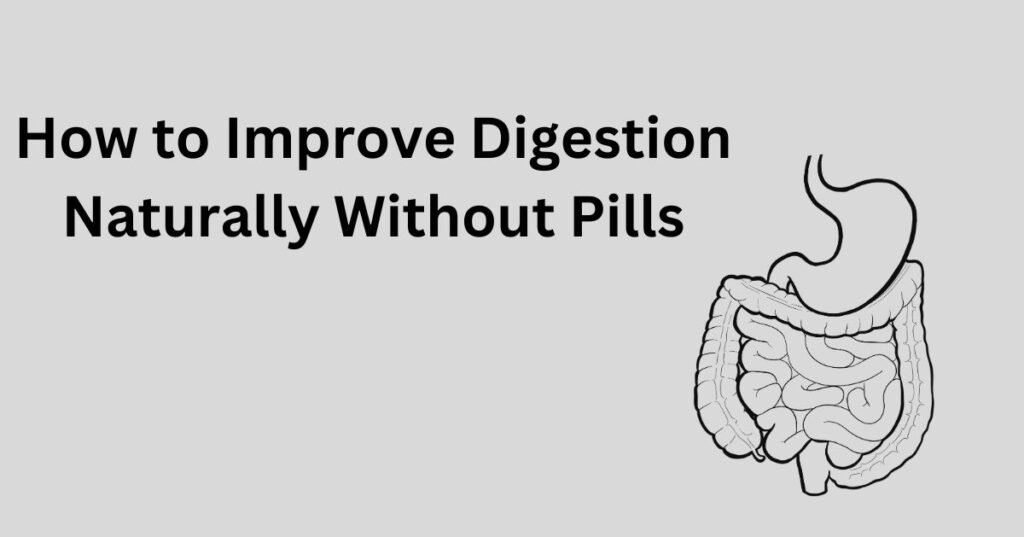“Boost your digestive health with simple, natural habits for a healthier gut.”
Introduction to Natural Digestion Improvement
Digestion is a crucial process that breaks down the food we eat into nutrients our bodies can use. Poor digestion can lead to discomfort, bloating, and nutrient deficiencies. Fortunately, improving digestion naturally without relying on pills is achievable through mindful eating habits, physical activity, stress management, and incorporating digestive-friendly foods. This comprehensive guide explores natural and effective ways to improve your digestive health for long-term well-being.
Adopt Healthy Eating Habits
Chew Your Food Thoroughly
Proper chewing breaks food into smaller pieces, making it easier for digestive enzymes to work. Chewing slowly also signals the body to produce digestive juices, aiding in better digestion. This practice can prevent indigestion and bloating.
Eat Smaller, More Frequent Meals
Large meals can overwhelm the digestive system. Eating smaller portions more frequently helps manage digestion and prevents bloating. Aim for 4-6 small meals throughout the day to keep your digestive system active without overloading it.
Include Fiber-Rich Foods
Fiber adds bulk to stool and promotes regular bowel movements. Include fruits, vegetables, whole grains, and legumes in your diet for optimal digestive health. Soluble fiber (oats, apples) and insoluble fiber (whole grains, vegetables) both play essential roles in digestion.
Stay Hydrated
Drinking enough water aids digestion by softening stool and supporting nutrient absorption. Aim for at least 8 glasses of water daily. Herbal teas and water-rich foods like cucumbers and watermelon also contribute to hydration.
Limit Late-Night Eating
Eating late at night can disrupt digestion and lead to poor sleep quality. Try to finish eating at least 2-3 hours before bedtime to allow your digestive system to process food properly.
Incorporate Probiotics and Fermented Foods
Eat Fermented Foods
Foods like yogurt, kefir, sauerkraut, kimchi, and miso are rich in probiotics that balance gut bacteria and improve digestion. Probiotics can reduce symptoms of bloating, gas, and constipation.
Consume Prebiotic Foods
Prebiotics like garlic, onions, leeks, and bananas feed beneficial gut bacteria, enhancing digestion and gut health. Combining prebiotic and probiotic foods creates a healthy environment for your digestive system.
Make Your Own Fermented Foods
Consider making your own kefir, yogurt, or fermented vegetables. Homemade versions are free from added sugars and preservatives, providing pure and potent probiotic benefits.
Engage in Regular Physical Activity
Practice Gentle Exercise
Walking, yoga, and stretching can stimulate the digestive tract and reduce constipation. A simple 20-minute walk after meals can significantly improve digestion.
Incorporate Core-Strengthening Workouts
Strengthening core muscles can improve gut motility and support overall digestion. Pilates and core exercises help engage the abdominal muscles, promoting bowel movement.
Try Yoga Poses for Digestion
Yoga poses such as Child’s Pose, Seated Twist, and Cat-Cow stretch can massage internal organs and relieve bloating and gas.
Manage Stress Levels
Practice Mindfulness and Meditation
Chronic stress can negatively impact digestion. Mindful practices like meditation, deep breathing exercises, and progressive muscle relaxation can relax the digestive tract and improve gut function.
Engage in Relaxing Activities
Activities like journaling, painting, or spending time in nature can reduce stress levels and indirectly improve digestion.
Get Adequate Sleep
Poor sleep disrupts digestion and gut health. Aim for 7-9 hours of restful sleep each night. Creating a bedtime routine and limiting screen time can help improve sleep quality.
Avoid Harmful Eating Habits
Limit Processed Foods and Sugars
Processed foods and sugars can disrupt gut flora and slow digestion. Opt for whole, unprocessed foods instead. Reduce intake of sugary drinks, fast food, and packaged snacks.
Reduce Intake of Caffeine and Alcohol
Excessive caffeine and alcohol irritate the digestive tract. Limit these to improve digestion naturally. Replace coffee with herbal teas and alcoholic drinks with non-alcoholic alternatives.
Avoid Overeating
Eating too much in one sitting can strain the digestive system. Pay attention to hunger cues and stop eating when you feel satisfied, not overly full.
Try Herbal Remedies
Drink Herbal Teas
Herbal teas like ginger, peppermint, fennel, and chamomile soothe the digestive system and relieve bloating and gas. These teas can be consumed after meals to aid digestion.
Use Digestive Spices
Incorporate spices like turmeric, cumin, coriander, and fennel seeds into meals to stimulate digestion. These spices have natural carminative properties that prevent gas and bloating.
Explore Traditional Digestive Practices
Practice Intermittent Fasting
Intermittent fasting allows the digestive system to rest and repair. A simple 12-16 hour fasting window can improve digestion and metabolic health.
Adopt Ayurvedic Eating Principles
Ayurveda emphasizes eating warm, cooked foods, using digestive spices, and eating in a calm environment to support digestion.
Conclusion
Improving digestion naturally without pills is possible through mindful eating, regular exercise, stress management, and incorporating gut-friendly foods. By adopting these simple yet effective habits, you can support a healthier digestive system and overall well-being. Long-term digestive health requires consistent care and a balanced lifestyle. Embrace these practices, and your digestive system will thank you.
FAQs About Natural Digestion Improvement
Q1: What foods help improve digestion naturally?
Fiber-rich foods, fermented foods, and prebiotics like garlic and bananas can enhance digestion.
Q2: How does exercise impact digestion?
Gentle physical activities like walking and yoga stimulate digestion and prevent constipation.
Q3: Can stress affect digestion?
Yes, chronic stress disrupts digestive functions, leading to issues like bloating and indigestion.
Q4: Are herbal teas effective for digestion?
Herbal teas such as ginger and peppermint can soothe the digestive tract and reduce bloating.
Q5: How much water should I drink to aid digestion?
Aim for at least 8 glasses of water daily to support smooth digestion and nutrient absorption.
Q6: What is the role of probiotics in digestion?
Probiotics balance gut bacteria, improving digestion and reducing symptoms like bloating and gas.
Q7: How does sleep impact digestion?
Lack of sleep can disrupt hormones that regulate digestion, leading to poor gut health.
Q8: Can intermittent fasting improve digestion?
Yes, intermittent fasting gives the digestive system time to rest and repair, enhancing overall function.



